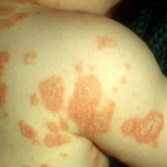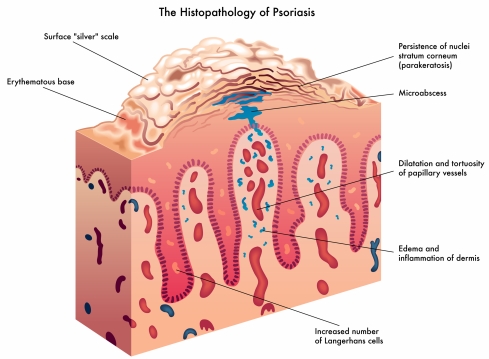CURE PSORIASIS WITH TAMANU OIL
Tamanu Oil is the South Pacific skin remedy for how to get rid of Psoriasis and Psoriatic Arthritis – it is a natural product which has delivered much-needed relief for psoriasis suffers where no other product has.

The above “before and after” image was supplied to us by one of our bulk Tamanu Oil customers. Jeannine’s client had been suffering from psoriasis for 4-5 months and apparently he tried everything and our Tamanu Oil was the only thing that worked.
WHAT IS PSORIASIS?
Psoriasis is a chronic, autoimmune disease that presents itself on the skin, often on the elbows, scalp and knees. However in severe cases, Psoriasis can be found anywhere on the body or all over the body from head to toe. Although not contagious, this condition comes in 5 different forms – Plaque Psoriasis (the most common form), Pustular Psoriasis, Guttate Psoriasis, Erythrodermic Psoriasis and Inverse Psoriasis. Usually only one form of the condition will present itself at any one time. However, even if that form of Psoriasis clears up, another form of psoriasis will usually appear in response to some trigger.
Basically, the sufferer’s immune system is accidentally triggered, so as to cause the rapid acceleration of skin cell growth. Instead of a normal skin cell taking around 29 days to mature before then being shed by the body, a skin cell in a psoriasis sufferer only takes 3 or 4 days to mature and instead of the body shedding it, the cell piles up on the surface of the skin, forming psoriasis lesions.
These lesions frequently appear as red, raised patches covered with scale (a silvery white buildup of dead skin cells). Psoriasis can also be associated with other serious health conditions, such as heart disease and diabetes.
The condition occurs in about 3% of the population. Now this may not sound much but in the USA alone, this accounts for 8-9 million people (according to the National Institutes of Health). The condition can start at any age (even as a baby) but it often tends to develop, in both males and females, in their late teens or early twenties. Many simply grow out of the condition over time but some don’t and some have a second peak when they reach their fifties.When it comes to widespread skin conditions, Psoriasis can be tough on the patient. Apart from pain and discomfort, the sufferer can become extremely self-conscious about his or her appearance. The condition can prevail for many years and even for life. This in turn can lead to low self esteem, depression and even suicide.

There is also a condition known as Psoriatic Arthritis. This is an immune system disorder that includes both psoriatic skin lesions and joint inflammation, although they may not necessarily occur at the same time.
WHAT CAUSES PSORIASIS?
Like so many other skin conditions (such as Acne, for example), the exact cause of Psoriasis is unknown. Most research scientists seem to agree that a combination of a person’s immune system and genetics is essential for Psoriasis to even develop. Even though only 2-3 % of the population develops Psoriasis, it is suspected that 10% or more of the general population inherit one or more of the genes that create a predisposition to Psoriasis. However, the general consensus between scientists is that apart from being genetically predisposed to Psoriasis, the condition won’t develop without some exposure to specific external triggers.

So what are these external triggers? Like allergies, they are wide and varied. In fact, in many cases the actual trigger or triggers is/are never identified. What is known is that just because a certain trigger may produce Psoriasis in someone with the necessary, genetic pre-disposition, does not mean that the same trigger will activate the condition in another person with that same genetic pre-disposition.
As with Acne, there are plenty of people with an opinion on what triggers or what causes Psoriasis. These are unproven theories from diet, allergies, the weather, cleanliness through to anything and everything in the environment or a combination of all these elements.
The known Psoriasis triggers include infection, certain medications, injury and stress. A streptococcal (strep) infection is known to trigger Psoriasis Guttate. Medications such as Quinidine, Lithium, Indomethacin, Inderal and various others are known to aggravate the condition in many cases. If you suffer from Psoriasis, you should always check with your doctor as to any medications you may be taking that could worsen the condition. Known as the Koebner phenomenon (also called the “Koebner response” or the “isomorphic response”), Psoriasis can develop in areas of the skin that have been injured or traumatized in some way. The injury or trauma could range from a skin abrasion, a scratch, a needle (as in a vaccination) through to a repair scar following an operation (eg. a hernia).
COMMON TREATMENTS FOR PSORIASIS
In Western society, the common treatments for Psoriasis have been limited to:
Over-The-Counter Medications
These products are purchased without a doctor’s prescriptions from drugstores, pharmacies or direct from the manufacturer or a reseller. There are over 400 different products ranging from anti-itch products and scale lifters to various ointments, lotions and scalp treatments. Unfortunately for the Psoriasis sufferer, most of these don’t work and can be detrimental due to harmful chemicals and toxins.
Prescription Medications
These are medications that do require a doctor’s prescription. For information about these products, talk to a doctor who is familiar with prescribing them, as there can be negative side effects. At best, these medications have varying results but none cure Psoriasis.
Other Treatments
There are various Ultraviolet phototherapy systems for Psoriasis treatments. Phototherapy or ultraviolet light is the application of mid wave light energy (Ultraviolet-B light [UVB]) or long wave light (Ultraviolet-A [UVA]). While Ultraviolet phototherapy can slow down abnormal growth of normal skin cells which is associated with psoriasis, it carries with it some level of risk. Exposure to UV light over prolonged periods is known to increase the chances of contracting skin cancer. This is why in countries such as the USA, a doctor’s prescription is required to be certain that you are aware of the potential siude effects.
WHAT IS THE BEST TREATMENT FOR PSORIASIS?
Tamanu or more specifically, Tamanu Oil (scientific name is Calophyllum Inophyllum) is a largely undiscovered solution for many skin care problems. One of these is Psoriasis and another is Psoriatic Arthritis. While there have been a number of scientific studies on Tamanu Oil, the research has been limited, due largely to the product not being well known outside Pacific Island countries such as Vanuatu. However, sufficient scientific studies have been done in Europe and the USA to know that this oil has the unique ability to promote the formation of new skin tissue and that it possesses anti-inflammatory, anti-neuralgic, antibiotic and antioxidant properties. It’s also all natural – zero chemicals or harmful toxins!
Tamanu Oil is suitable for the treatment of Psoriasis on the hands, arms, feet, legs, face and the body generally.
TAMANU OIL FOR SCALP PSORIASIS
While Tamanu Oil can be used for scalp Psoriasis, we have found that the best product for Psoriasis of the scalp is our own, specially-formulated Tamanu Butter which can be found in our Tamanu Oil Range. Just place a small amount (about half a teaspoon) in the palm of one hand, rub together with the other hand until it melts from your own body heat and just massage your scalp. Do this at least once a day and you should see marked results within a few days.
This information has not been evaluated by the Food and Drug Administration. This information is not
intended to diagnose, treat, cure, or prevent any disease.
Read more about treating skin problems:
TAMANU OIL IS GOOD FOR ECZEMA IN BABIES, CHILDREN AND ADULTS
